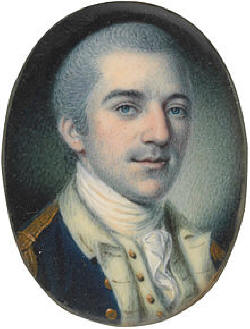

Queer Places:
Laurens Family Cemetery Moncks Corner, Berkeley County, South Carolina, USA
 John
Laurens (October 28, 1754 – August 27, 1782) was an American soldier and
statesman from South Carolina during the American Revolutionary War, best
known for his criticism of slavery and his efforts to help recruit slaves to
fight for their freedom as U.S. soldiers.[1]
John
Laurens (October 28, 1754 – August 27, 1782) was an American soldier and
statesman from South Carolina during the American Revolutionary War, best
known for his criticism of slavery and his efforts to help recruit slaves to
fight for their freedom as U.S. soldiers.[1]
In 1779, Laurens gained approval from the Continental Congress for his plan to recruit a brigade of 3,000 slaves by promising them freedom in return for fighting. The plan was defeated by political opposition in South Carolina, and Laurens was killed in the Battle of the Combahee River in August 1782.
As a young man in Geneva, from ages 16 to 19, Laurens "never had difficulty attracting women and men", while reserving "his primary emotional commitments for other men."[28] According to Laurens' biographer Gregory D. Massey, this period "marked the beginning of a pattern; he continually centered his life around homosocial attachments to other men."[28] Homosociality, in sociology, refers to same-sex relationships that are not of a romantic or sexual nature, such as friendship, mentorship, and male bonding.
Shortly after his marriage, while in Washington's camp, Laurens met and became extremely close friends with Alexander Hamilton. They exchanged many letters during the several years when different assignments and Laurens' capture by the British kept them apart; for example, when the terms of Laurens' parole prevented him from being present at Hamilton's wedding to Elizabeth Schuyler in December 1780, even though Hamilton had invited him.[29] While emotional language was not uncommon in romantic friendships among those of the same gender in this historical period,[30] Hamilton biographer James Thomas Flexner stated that the intensely expressive language contained in the Hamilton-Laurens letters "raises questions concerning homosexuality" that "cannot be categorically answered".[31]
Stating that "one must tread gingerly in approaching this matter," Hamilton biographer Ron Chernow wrote that it is impossible to say "with any certainty" that Laurens and Hamilton were lovers, noting that such an affair would have required the exercise of "extraordinary precautions" because sodomy was a capital offense throughout the colonies at the time.[30] Chernow concluded that based on available evidence, "At the very least, we can say that Hamilton developed something like an adolescent crush on his friend."[30] According to Chernow, "Hamilton did not form friendships easily and never again revealed his interior life to another man as he had to Laurens", and after Laurens' death, "Hamilton shut off some compartment of his emotions and never reopened it."[30]
In contrast to Hamilton's effusive letters, surviving letters from Laurens to Hamilton were notably less frequent and less passionately worded, although some letters written by Laurens have been lost or may have been destroyed.[30]
Massey has dismissed speculations on John Laurens' supposed homosexuality and on a Laurens-Hamilton relationship as unsubstantiated, concluding, "Their relationship was platonic, a bond formed by their devotion to the Revolution and mutual ambition for fame."[32] Years later, Massey regretted that the tone of his assertion had been decisive rather than equivocal, conceding that the matter "can not be definitively resolved."[33]
My published books: